Donolo diaries, Byers ceasefire proposal, and Michael Ignatieff, anti-monarchist
Nov 8th, 2009 | By L. Frank Bunting | Category: Ottawa Scene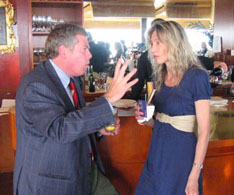
Peter Donolo harangues author and journalist Linda McQuaig at launch of Linda Diebel’s book on Stéphane Dion, May 2007.
These are not easy days for aspiring progressive voters in Canadian federal politics, at the edge of four by-elections that actually will happen on Monday, November 9.
According to the October 29 EKOS poll, eg: “Stephen Harper’s federal Conservatives lead the second-place Liberals by a double-digit margin for the fourth week in a row, suggesting that the neck-and-neck race between the two major parties in the spring and summer has now been displaced by a new pattern of relative Conservative dominance.”
Meanwhile, Mr. Harper’s minority government is being kept in office by the as-required strategic votes of Jack Layton’s New Democrats – ironically seen by some supporters as more progressive than the Michael Ignatieff Liberals.
And what about Elizabeth May’s federal Green Party? It attracted a full 10% of the cross-Canada vote in the November 5 EKOS poll, but has never won a seat in Parliament. Then, if you live in Quebec, there is also the sometimes progressive Bloc Quebecois – which has more seats in the Canadian House of Commons than the NDP.
As EKOS president Frank Graves has also reminded us, these grim circumstances do not “mean the Conservatives can’t be knocked off their current pedestal – their lead has actually ebbed slightly from earlier this month.” (Well, last month now.) A few other signs of dim hope have lately arisen as well, to save aspiring progressive voters from utter despair.
First, Liberal leader Michael Ignatieff has hired the street-smart Chretien-regime veteran Peter Donolo as a new chief of staff. This has lifted the spirits of the Grits’ parliamentary caucus in Ottawa, and briefly grabbed at least central Canadian mass media attention.
Meanwhile, out on Canada’s Pacific coast, Professor Michael Byers, who ran for the New Democrats in the last federal election, has advanced a provocative proposal for a Liberal-New Democrat “ceasefire” in the next election (which could extend to the Green Party too?).
Finally, someone has dredged up an old article by Michael Ignatieff himself, disparaging the British monarchy in 1992. Some think this could hurt Mr. Ignatieff in Canadian politics today. Others think the opposite – and they are more likely right.
Donolo diaries …
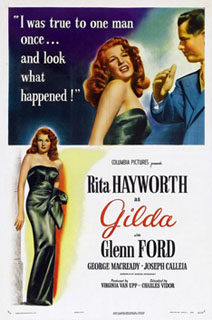
Journalist Paul Wells reports that in the old days in Ottawa “Peter Donolo, famously, decorated his office with huge posters from classic Hollywood movies.” This 1946 case in point, “Gilda,” with Rita Hayworth and Glenn Ford (also born, like Donolo, in la belle province du Québec), is rumoured to be one of Peter Donolo’s favourites.
Some friends of the Liberal Party of Canada had big doubts about Michael Ignatieff from the start.
This fall it has become clear to almost everyone else that he does have big problems – even if you discount the apparently effective Conservative propaganda that he is still “just visiting” Canada. (Which has no doubt been effective because Mr. Ignatieff actually has lived outside the country most of his adult life – even if he did keep his Canadian passport.)
One problem has been the Ignatieff chief of staff, Ian Davey, 51. He was among those who first talked Mr. Ignatieff into leaving his latest expat comfort zone in the US Ivy League for the political wilds of the “last lumber village before the North Pole” in Ottawa. Mr. Ignatieff showed some admirable deep loyalty to Mr. Davey in return.
Even though his father was the celebrated Trudeau-era “Rainmaker,” Keith Davey, however, Ian Davey has apparently proved too much of a comparative political neophyte – and/or too much of an intellectual like Mr. Ignatieff himself (?) – to properly advise his leader on exactly where the bodies are buried in Ottawa. (Also too much of a Torontonian, apparently again!)
So, as the story goes, after a few months of growing evidence that something was indeed rotten in the state of the Liberal Party (again), a tough decision to replace Mr. Davey finally gelled on Monday, October 26, 2009, when Canwest News gleefully reported: “A new poll shows support for the federal Liberal party has weakened so much that, were an election to be held today, Michael Ignatieff would lead his party to a worse showing than his predecessor, Stephane Dion.”
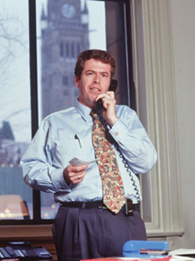
Peter Donolo, in his Ottawa office back in the old days of the 1990s, with what would appear to be a nice view of the Peace Tower out the window. According to Chantal Hébert in October 2009: “Au total, le retour de Peter Donolo est une tardive mais néanmoins bonne nouvelle pour le PLC et un signe concret de ce que le chef libéral prend sa situation actuelle au sérieux.”
The new good news went public on Tuesday, October 27: “Ignatieff moves to replace top aide … Former Chrétien staffer Peter Donolo to become Liberal Leaders’ new chief of staff” ; “Ignatieff appoints former Chrétien strategist to head staff” ; “Dept. Of Communications: Great Moments” ; “Ignatieff hires ex-Chrétien PR man as chief of staff” ; “Ignatieff drops chief of staff, hires Peter Donolo” ; “Ignatieff taps former Chrétien aide as new chief of staff.”
The plot thickened in various further directions on Wednesday, October 28: “Michael Ignatieff nomme Peter Donolo à titre de chef de cabinet” ; “Donolo tapped as Ignatieff’s top aide” ; “Ignatieff replaces top aide with former Chretien strategist” ; “Ignatieff hires Chrétien aide as chief of staff” ; “Ignatieff shakes up inner circle” ; “This is a game-changer” ; “Ignatieff a un nouveau chef de cabinet” ; “Ignatieff se rapproche du camp Chrétien” ; “Michael Ignatieff fait son ménage” ; “Libs upbeat after Ignatieff staff change” ; “John Manley says he wasn’t a player in the Donolo move” ; “Peter Donolo and the Curse of the Mummy’s Hand” ; “Ten things about Peter Donolo” ; “Iggy, on t’oubliait presque” ; “Righting the listing Liberal ship” ; “Donolo’s challenge: stop the Liberals’ ugly slide” ; “Enter Peter Donolo, a Chrétien guy to the rescue.”
From here there was something of a denouement, through to the end of the week: “Ignatieff learns the hard way” ; “Ignatieff’s new guy and the Nervous Nellies” ; “Different situation for Donolo this time” ; “Ailing Liberals keep looking for a miracle cure.”
So, who is Michael Ignatieff’s new chief of staff, Peter Donolo? Very quickly, he is now 50 years old. He grew up in Montreal, where he attended Lower Canada College (a kind of Montreal anglophone analogue to the ancient top Toronto private school, Upper Canada College – and also an alma mater of Michael Ignatieff’s father).
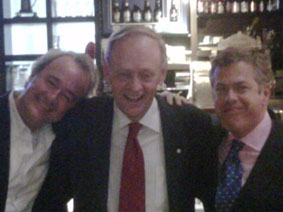
L to r: Warren Kinsella, Jean Chrétien, and Peter Donolo, at the Freedom at Depth event at Labatt House, Toronto, April 2009.
Even in anglophone Montreal in the 1960s and 1970s, Peter Donolo became bilingual. But he subsequently moved to Toronto, where he worked for Art Eggleton (“the longest serving mayor in Toronto history,” 1980—1991). He then served as communications director for Jean Chretien in Ottawa, 1991-1999 (during both Mr. Chretien’s careers as Liberal opposition leader and then as Prime Minister of Canada).
Mr. Donolo has most recently been a high-profile partner in the Toronto-based Strategic Counsel polling, consulting, and market research firm. He is well liked among his peers, and widely admired and respected for his political street smarts and public policy savvy.
Can Peter Donolo stop the recent Ignatieff Liberal slide? Of course only time will tell, definitively. Meanwhile, there is much testimony about his talent, and the potential significance of his new appointment. E.g.:
“Au total, le retour de Peter Donolo est une tardive mais néanmoins bonne nouvelle pour le PLC et un signe concret de ce que le chef libéral prend sa situation actuelle au sérieux” [Chantal Hébert] ; “Donolo’s arrival is no guarantee of a miracle … But Donolo corrects … for the constant failure of the last four Liberal leaders: he has seen a Liberal win … He knows what victory looks like” [Paul Wells] …
“We need experience and that’s what Mr. Donolo brings … lots of experience and a record of focusing on the concerns of the average Canadian” [Liberal MP John McCallum] ; “The fact that Michael Ignatieff still has enough drawing power to attract a chief of staff of Peter Donolo’s calibre is the strongest signal in weeks that his leadership has not yet reached the point of no return” [Chantal Hébert again, in the other official language].
Byers Liberal-New Democrat ceasefire proposal
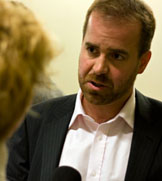
Michael Byers talks to the media in Vancouver Centre, in the 2008 Canadian federal election campaign.
One thing Peter Donolo cannot quite bring to Michael Ignatieff’s Liberal Party of Canada table is deep experience in and connection to the increasingly important Canadian political and economic region of Western Canada.
Here, from at least an abstract point of view, a November 2 column in the Toronto Star, by the British Columbia New Democrat Michael Byers, becomes interesting. The title summarizes the essential message: “Liberals and New Democrats together could unseat Harper … Electoral ceasefire would put nation’s centre-left majority in political control.”
Mr. Byers is not arguing for any kind of “coalition” between the Liberals and the New Democrats. He is just urging that: “The Liberals and NDP should agree to not run candidates against each other in the next campaign … In each riding, the party whose candidate fared worst in the last election would pull its current candidate out, or refrain from nominating one.”
He goes on: “Both parties would win more seats, with the Liberals potentially forming a majority government … Based solely on the results from October 2008, the agreement would, in itself, deliver 30 to 40 additional seats to the Liberals and another five to 10 seats to the NDP.”
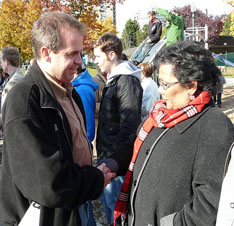
New Democrat Michael Byers and Liberal Hedy Fry exchange some guarded pleasantries in Vancouver Centre during the 2008 election campaign.
And he stresses again: “Importantly, what is proposed is not a coalition, but a one-time ceasefire between two opposition parties whose combined vote share last time was significantly higher …Â than the Conservatives … No effort would be made to coordinate platforms …Nor would the agreement extend to post-election power sharing. If the Liberals were in a position to form a minority government, they would be free to seek support from any of the other parties.”
Byers does include one ingredient in his proposal that strikes me as an unnecessary red herring – at this point in time at any rate: “The only post-election condition in the agreement should be an unqualified public commitment to holding a national referendum on proportional representation within the first year.” Beyond this, I think the proposal makes a great deal of sense – though perhaps for that very reason it is probably not going to make much headway in the current dysfunctional morass of Canadian federal politics.
On a final footnote (or two) here, there are as well some intriguing similarities between Michael Byers and Michael Ignatieff. Like Ignatieff Byers is an academic and public intellectual, with something of a track record outside Canada. Among various other things, Byers’s recent book Intent for a Nation is both a rejection of and a respectful homage to the 1965 classic Lament for a Nation by the late George Grant, who was Michael Ignatieff’s uncle.
Finally, although Byers finally ran (unsuccessfully, this time) for the NDP in the 2008 Canadian federal election, he had earlier been courted by the Liberals. Moreover, in a rather pleasing example of ironic and public-spirited self-sacrifice, in 2008 he ran against the ever-victorious Liberal Hedy Fry in Vancouver Centre. So on his own proposed Liberal-NDP ceasefire he could at least not run again in the next election for the New Democrats in Vancouver Centre. When any proposal of this sort actually works against the immediate self-interest of its proponent, you know that at least something about it has to be good.
Michael Ignatieff, anti-monarchist
Even now, just watching Michael Ignatieff’s performance in Parliament, you can often enough see that, whatever else, he is still capable of projecting a weight and heft – or, maybe, even “gravitas” – that goes beyond the rhetorical talents of Stephane Dion. If Iggy or Iffy, or whatever his name is now, remains a practical political neophyte himself, he also remains a world-class public intellectual (more or less), who is quite capable of standing up impressively to whatever rigours the Canadian House of Commons might from time to time present.
As further evidence that, to quote Chantal Hébert yet again, Michael Ignatieff’s “leadership has not yet reached the point of no return,” I at least was mildly encouraged as well by something published in the National Post on November 2, under the headline “Stephen Taylor: Michael Ignatieff, anti-monarchist.”
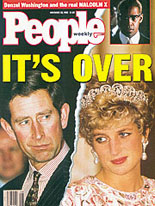
Even People magazine in the USA was fascinated by the end of Charles’s and Diana’s marriage – which also prompted Michael Ignatieff to reflect that “greatness is what monarchy once implied, and the greatness is irrevocably gone.”
This is a reprint of an article first written by Ignatieff for the Observer in the United Kingdom “after the separation of the Prince and Princess of Wales” (which was first announced by British Prime Minister John Major on December 9, 1992). Ignatieff’s article was subsequently republished in Canada, in the Montreal Gazette, on December 12, 1992.
In this now 17-year-old piece Ignatieff urged that the “Royal family is not doing its job” in the way it handled the separation of Charles and Diana, and ultimately: “Listening to the separation announcement, I found myself wondering exactly why this shambles was so magically preferable to an elected presidency … I will be told that republicanism is alien to British traditions. This is monarchist cant. Britain is the home of the doctrine of popular sovereignty. From the English revolution of 1640 to the Reform Act of 1832, the British people taught continental Europe how to bend a monarchy to the popular will.”
Mr. Ignatieff concluded: “For greatness is what monarchy once implied, and the greatness is irrevocably gone … If so, why retreat further? Why not turn retreat into an opportunity for reform? Now is the time for the republican tradition in Britain to find its voice again …the choice the British face is between clinging to an institution which has had its day or affirming what their history has always taught, which is that ‘We, the people’ and not the crown are the source of all power and authority in this island.”
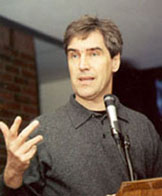
Michael Ignatieff in an earlier era ... he was an “editorial columnist” with the Observer in the UK 1990-1993.
In the midst of Charles and Camilla’s first Canadian visit together, this Ignatieff article from the early 1990s was apparently discovered and put at the disposal of the National Post by one “Stephen Taylor [who] is a scientist, political analyst and a Fellow at the Manning Centre for Building Democracy, an institute founded by Preston Manning.” Randy Boswell of Canwest News Service also wrote about the article in a November 3, 2009 piece that appeared in the Ottawa Citizen, entitled “Ignatieff may be haunted by past words about monarchy.”
The implication of Boswell’s piece was that this 1992 article by Michael Ignatieff could actually get a Canadian politician in quite a lot of trouble, even in 2009. Yet this seems an odd point of view, given the overall reception to the current Canadian visit of Charles and Camilla – which has been described by Rex Murphy at the CBC as a “tour” with “more than a touch of unacknowledged farewell about it.”
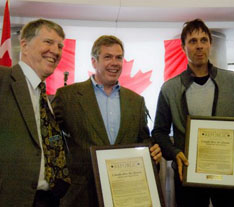
(L to r) Phil Taylor of CIUT radio, Peter Donolo, and Royal Canadian Air Farce alumni Alan Park at Toronto forum on “Does Canada Need a Queen?”, May 2009.
I was similarly impressed by some related comments from Kady O’Malley at the CBC Inside Politics Blog. She was “surprised … when Conservative supporters began circulating some of Michael Ignatieff’s past comments” on the British monarchy: “As I asked one of them … for heaven’s sake, why highlight that, of all things? It may be the most popular stance he’s taken since he became leader – or possibly ever.”
More than a few of the reader comments elicited by the November 2 National Post reprint of the now 17-year-old Ignatieff article suggest that Ms. O’Malley has a point. [Eg: “Wouldn’t it be great if our PM had a record like Ignatieff’s of intellectual curiosity and communication of complex (and maybe controversial) ideas.]
In my own case, I have been sceptical about Michael Ignatieff in the past – and I have wondered just how much he really does know and appreciate about the country of his birth, where he has not lived for most of his adult life. But if he actually were going to start talking about the British monarchy in Canada like this in Ottawa today, maybe he could finally do something worthwhile for the Canadian future.
And especially if he were going to start listening to such things as Michael Byers’s recent Liberal-New Democrat ceasefire proposal too, I might even start to think about actually voting for him – and (who knows?) even giving some modest sum of money to the Liberal Party of Canada!
I would agree as well that the legions of Ottawa cynics are probably right. Nothing of this sort is ever likely to really happen. (This is just Canada after all.) But what a world it would be if it did.
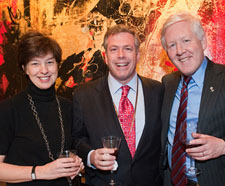
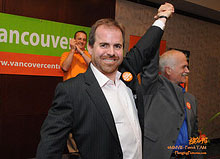
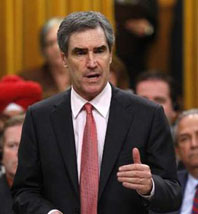
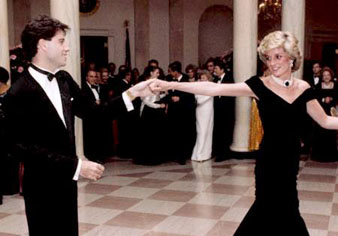


Give Michael Ignatieff a chance. He may regret what he wrote in 1992. Everybody is entitled to learn from one’s mistakes.
Why would Ignatieff regret what he wrote in 1992? As Kady O’Malley says, “it may be the most popular stance he’s taken since he became leader — or possibly ever.â€